Beaufort scale
Conversion between wind speed measurement units including Beaufort numbers, km/h, m/s, mph, fps.
Beaufort scale was created in 1805 by Sir Francis Beaufort, British admiral, and hydrographer. It describes wind speed based mainly on observed sea conditions.
Wind speed on the Beaufort scale can be expressed by the formula:
m/s
where v is wind speed and B is Beaufort scale number.
The following online calculator converts common wind speed given in common measurement units to Beaufort numbers.
Beaufort scale with pictures
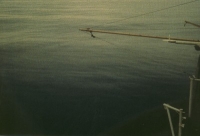
Beaufort number 0 - Calm
wind speed: <1 knots (<0.3 m/s)
wave height: no waves
sea: Flat, like a mirror
land: Smoke rises vertically
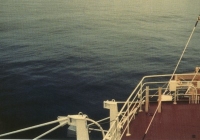
Beaufort number 1 - Light air
wind speed: 1-2 knots (0.3-1.5 m/s)
wave height: 0.33ft (0.1 m)
sea: Ripples without crests.
land: Direction of wind shown by smoke drift only
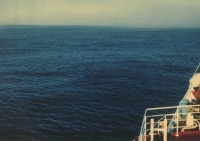
Beaufort number 2 - Light breeze
wind speed: 3-6 knots (1.5-3.3 m/s)
wave height: 0.66ft (0.2 m)
sea: Small wavelets. Crests of glassy appearance, not breaking.
land: Wind felt on exposed skin. Leaves rustle.
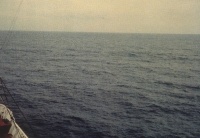
Beaufort number 3 - Gentle breeze
wind speed: 7-10 knots (3.3-5.5 m/s)
wave height: 2ft (0.6 m)
sea: Large wavelets. Crests begin to break; scattered whitecaps.
land: Leaves and smaller twigs in constant motion.
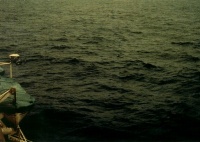
Beaufort number 4 - Moderate breeze
wind speed: 11-15 knots (5.5-8.0 m/s)
wave height: 3.3ft (1 m)
sea: Small waves becoming longer, fairly frequent white horses.
land: Dust and loose paper raised. Small branches begin to move.
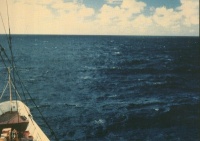
Beaufort number 5 - Fresh breeze
wind speed: 16-20 knots (8.0-10.8 m/s)
wave height: 6.6ft (2 m)
sea: Moderate waves taking more pronounced long form. Many white horses, chance of some spray.
land: Branches of a moderate size move. Small trees begin to sway.
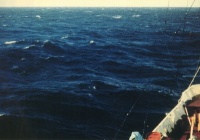
Beaufort number 6 - Strong breeze
wind speed: 21-26 knots (10.8-13.9 m/s)
wave height: 9.9ft (3 m)
sea: Larger waves begin to form. The spray is present. White foam crests are everywhere.
land: Large branches in motion. Whistling is heard in overhead wires. Umbrella use becomes difficult. Empty plastic garbage cans tip over.
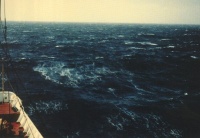
Beaufort number 7 - Near gale
wind speed: 27-33 knots (13.9-17.2 m/s)
wave height: 13.1ft (4 m)
sea: Sea heaps up, and foam begins to be blown in streaks in wind direction.
land: Whole trees in motion. The effort needed to walk against the wind. Swaying of skyscrapers may be felt, especially by people on upper floors.
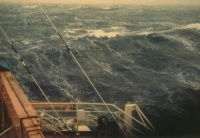
Beaufort number 8 - Fresh gale
wind speed: 34-40 knots (17.2-20.7 m/s)
wave height: 18ft (5.5 m)
sea: Moderately high waves of greater length. Edges of crest begin to break into spindrift. Foam is blown in well-mark streaks along the direction of the wind.
land: Twigs broken from trees. Cars veer on the road.
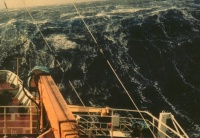
Beaufort number 9 - Strong gale
wind speed: 41-47 knots (20.7-24.5 m/s)
wave height: 23ft (7 m)
sea: High waves (6-7 m) with dense foam. Wave crests start to roll over. The spray may affect visibility.
land: Larger branches break off trees and some small trees blow over. Construction/temporary signs and barricades blow over. Damage to circus tents and canopies.
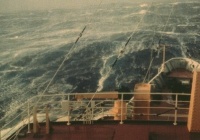
Beaufort number 10 - Storm
wind speed: 48-55 knots (24.5-28.4 m/s)
wave height: 29.5ft (9 m)
sea: Very high waves. Large patches of foam from wave crests give the sea a white appearance. Considerable tumbling of waves with heavy impact. Large amounts of airborne spray reduce visibility.
land: Trees are broken off or uprooted, saplings bent and deformed, poorly attached asphalt shingles and shingles in poor condition peel off roofs.
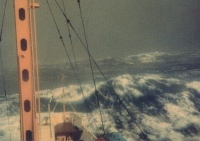
Beaufort number 11 - Violent storm
wind speed: 56-63 knots (28.4-32.6 m/s)
wave height: 37.7ft (11.5 m)
sea: Exceptionally high waves. Very large patches of foam, driven before the wind, cover much of the sea surface. Very large amounts of airborne spray severely reduce visibility.
land: Widespread vegetation damage. More damage to most roofing surfaces, asphalt tiles that have curled up and/or fractured due to age may break away completely.
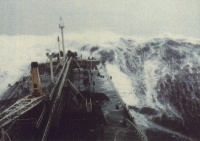
Beaufort number 12 - Hurricane
wind speed: ≥64 knots (≥32.6 m/s)
wave height: ≥46ft (≥14 m)
sea: Huge waves. Sea is completely white with foam and spray. Air is filled with driving spray, greatly reducing visibility.
land: Considerable and widespread damage to vegetation, a few windows broken, structural damage to mobile homes, and poorly constructed sheds and barns. Debris may be hurled about.
Note: Beaufort number images source: National Weather Service web site (http://www.crh.noaa.gov)
Comments